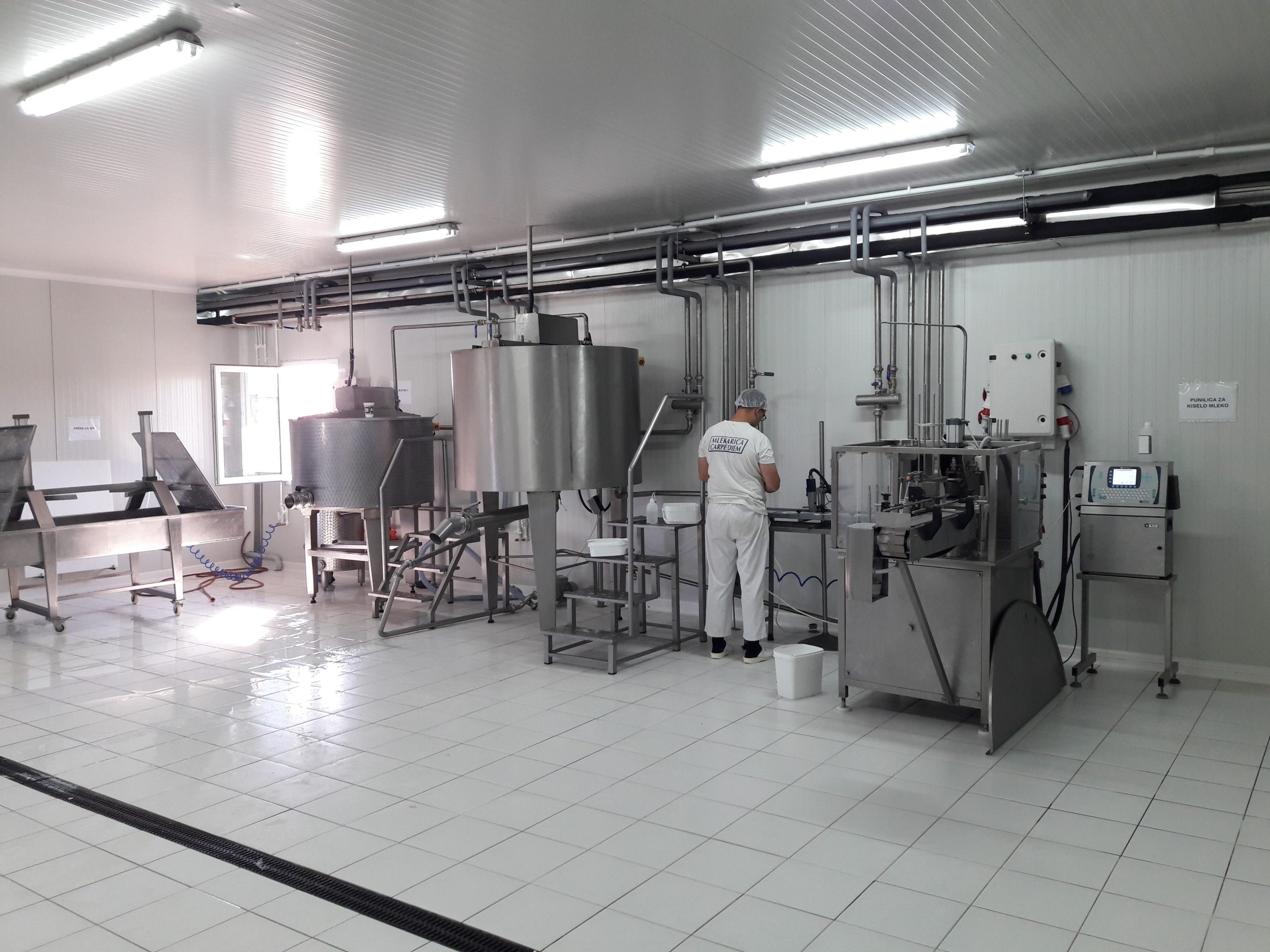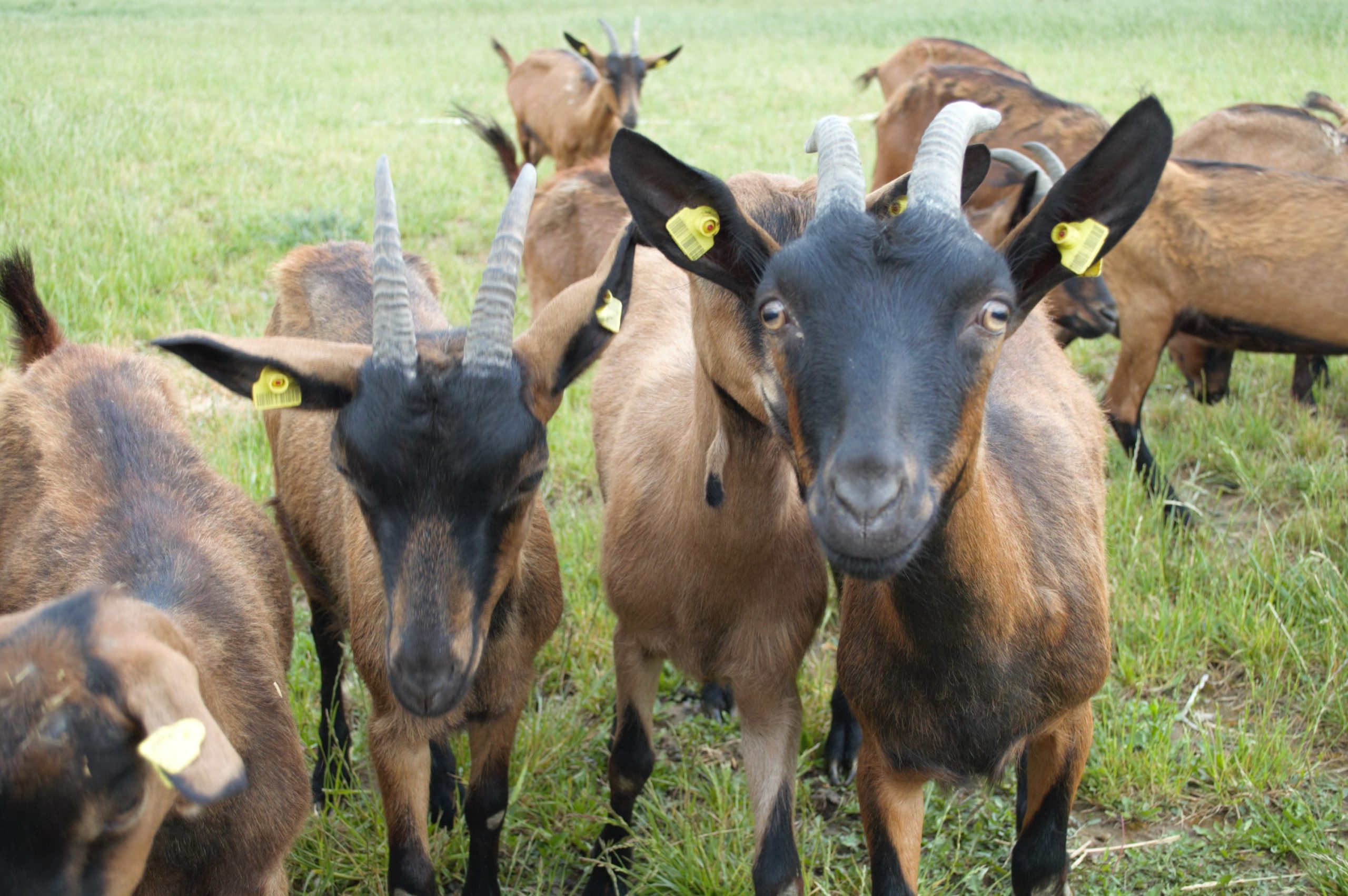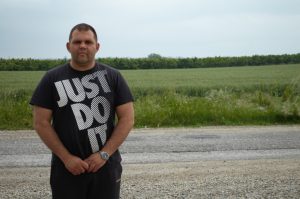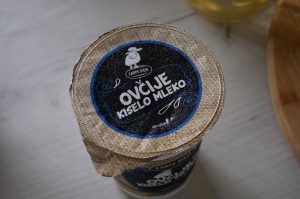Case study 01-RS
Aleksandar Stepanić
Introduction
Young farmer Aleksandar Stepanić and his partner Jelena Marić are taking care of about 250 goats at their estate of 1 ha, on the wonderful slopes of Fruška gora mountain. Together with 10 employees they process about 1000 liters of goat’s milk into various products (pasteurized milk, soft and many sorts of semi-hard cheeses and yogurt) every day. In addition, they daily process about 4000 l of cow’s and 300 l of sheeps’ milk that are not produced on their estate. In 2020, they started to create a concept of restaurant and traditional cheese-making school on their farm, for the purpose of rural tourism. Additionally, they are developing the fabrication of several products of organic lyophilized goat milk to become strategic export items.

Farm/Enterprise description
The farm of about 250 milking goats is located at the estate of 1 ha, on the slopes of Fruška gora mountain. Another 15 ha of farmland are rented from the state of Serbia. In the farm’s immediate surroundings is the dairy processing plant, daily processing 1000 l of goat’s milk, about 4000 l of cow’s and 300 l of sheeps’ milk. Goat’s milk coming from the farm is processed into high quality products: pasteurized milk, yoghurt, soft cheese, and semi-hard cheeses with different spices (paprika, oregano, etc.). Cow’s and sheeps’ milk which are not produced on their estate are processed into soft cheeses, yoghurt and traditional product named “kajmak”. Also, a traditional Balkan’s product called “kiselo mleko”, similar to yoghurt, is made from goat’s and sheep’s milk. Farm and dairy processing unit together has 12 full-time employees, including 2 family members. At the moment, as a part of multifunctional farming activities, facilities for a restaurant as well as traditional cheese-making school have been built. The facility is equipped to be used for both, education of traditional dairy processors and rural tourism. Furthermore, the production of several products of organic lyophilized goat milk is being developed, due to market demand and surplus in production.
“This job is not for an ordinary people because it takes extraordinary effort and motivation to do it successfully! The business needs to be more than an idea to make a product that you will sell to someone.”


Multifunctional farming activities related to dairy processing / Innovation related to products and/or processing
Being motivated by the income increase through the provision of unique services in rural tourism, the owners decided to open a restaurant that serves traditional and organic dairy products, as well as organic vegetables and wines. Another activity that supports cheese production, as well as the restaurant, is the traditional cheese-making school. The school is used both for education of traditional dairy processors and rural tourism. Potential tourists are able to make traditional dairy products and then to taste them in the restaurant. Beside mentioned activities, organic tomato and spices are grown at the estate to be served at the restaurant and as ingredient during cheese-making process. Implementing the technological process of the lyophilized milk production arose from the need to find a solution for the unprocessed milk that is the outcome of surplus in processing. They designed three products made from organic lyophilized goat’s milk including vanilla flavored, chocolate flavored and with probiotic bacteria.
General considerations
To implement process innovation and multifunctional farming activities, they received counseling in terms of milk processing technology, goat breeding, milking practice, and animal health that was provided by university professors from the University of Novi Sad, Faculty of Agriculture. Also, they passed different trainings and seminars regarding milk processing technology, animal breeding and nutrition, organic production, HACCP implementation, as well as, management, human resources, NLP training, business plan writing, IPA and IPARD funds application training. Despite the training, the main challenge is the state of the market in Serbia, where consumers are not used to purchasing goat’s milk products, therefore the demand is relatively low. This was one of the reasons why they decided to start the production of lyophilized goat’s milk, to make a product with longer expiration date that could be exported. The challenge with this production was finding an adequate partner because the procurement of lyophilizers and finding adequate support in Serbia is particularly challenging. Another idea to sell their products in such market conditions in Serbia, was to offer a package of rural tourism services where they can sell their products. In their opinion, this was found to be a good way to increase the profit, but also to point out the importance of traditional production and rural activities. Future activities relate to the introduction of hard goat cheese production and the production of lyophilized goat milk, which will make a foundation for the export. To achieve all this, they made several advertising campaigns that were mainly related to advertising through social networks. Additionally, there are about 700 written texts in the media about their activities. At this moment, they distribute the products by direct distribution with own delivery vehicles, through large retail chains, on-farm sales, online sales, as well as to restaurants, and hotels.


Training/Competences (Skills, Knowledge, Attitudes) especially relevant for the process
International seminars and trainings, together with experts’ counselling concerning marketing, drop shipping and online sales were of the utmost importance, especially in Serbia where some of these concepts are in development. However, their biggest limitation in education are trainings related to finance with an emphasis on the banking sector. Furthermore, the training in lyophilized milk and hard cheese production from goat’s milk, was essential for implementing the required technologies at the enterprise. Skills such as perseverance, continuous work on oneself, along with the non-formal education in processing technology, law, finance, marketing are found to be unavoidable part of any farmer that wants to become successful.
Photo gallery







